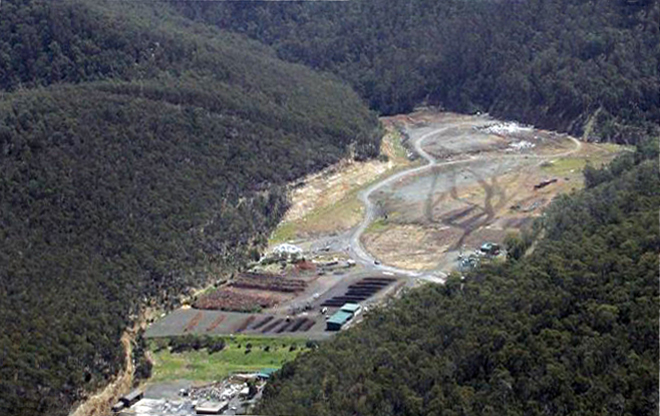A tax on the dumping of waste today will lessen the burden later

Hobart’s McRobies Gully landfill site, showing composting rows in the foreground. PHOTO Mercury
Like clockwork, each week we line our streets with bins of stuff we don’t want, and each week the stuff is whisked away, out of sight and out of mind.
In functioning ecosystems one species’ waste is another’s nourishment, but nature can’t readily absorb what’s in our bins. So it tends to accumulate where it’s dumped, a practice we call landfill.
Landfill isn’t the most polluting thing we do to the planet – that honour must go to sending greenhouse gases into the air – but it is the most visible sign of a chuck-and-forget mindset that’s a huge obstacle in the long journey to sustainability.
Luckily, a whole community of people is inspired by something the rest of us would rather forget. People like Mike Ritchie, who heads up MRA, a high-profile Sydney waste consultancy, Brad Masham, manager of Recovery Tasmania, and Jamie Wood of the Hobart firm SEAM.
All are connected with the Waste Management Association of Australia, which is campaigning for “harmonised” policies and an integrated national waste management system with stronger recycling incentives. So far, waste hasn’t rated a mention in the federal campaign, but it should.
At a Hobart seminar Wood and Masham organised this month for WMAA, Ritchie put Tasmania’s waste management into a national perspective.
Tasmania’s waste record is at the bottom of the ladder in a country that’s mediocre by developed-world standards. Official figures put diversion of waste to recycling at 58 per cent across Australia but just 33 per cent in Tasmania. Independent research suggests both figures are exaggerated.
All states and territories have formal targets of at least 65 per cent diversion from household waste to recycling by 2020 (in NSW the target is 85 per cent) – except for Tasmania and Northern Territory, which have no targets.
Tasmania’s tardiness has one benefit. The main alternative to landfill, incineration, has had a troubled history with pollution. New technologies yield gas or electrical energy as well as less pollution, but questions remain around efficacy, safety and greenhouse emissions.
Low-emitting pyrolysis, which happens in the absence of oxygen, is a promising option for dealing with some intractable waste problems such as tyres. A pyrolysis plant is planned for Tasmania, at Longford, fuelled by a huge stockpile of tyres.
More than half our waste is food and plant material, which when dumped produces the potent greenhouse gas methane. We’re never going to capture more than half that methane, so we need to keep as much organic waste as possible out of landfill.
Among biological treatments, anaerobic digestion – use of microorganisms to break down biodegradables to produce biogas – has long-term possibilities, but the option that holds greatest promise for Tasmania is also the cheapest: compost.
The business of composting organic waste has taken off in Australia, with the number of facilities doubling in a decade. Ten years ago Tasmania had no large-scale composting facility. Now it has four: two in southern Tasmania and two in the north.
Households are getting better at recycling, but it’s barely on the radar in the commercial and industrial sectors, which produce most of our waste. That has to change.
Like carbon emissions, landfills are a market failure crying out for a price solution. Mike Ritchie cites surveys showing strong community support for a progressive tax on landfills, and nearly all Tasmanian local councils want one.
Yet alone among the states, Tasmania has no uniform landfill levy. Environment minister Matthew Groom can’t seem to get around minority business opposition to the recycling industry and his government’s aversion to any new tax, but none of that is any excuse for his inaction.
Let’s not kid ourselves: waste is deeply ingrained in economic structures, and while recycling can mitigate its impact it can’t change those structures.
But an economy-wide levy on all dumping will add one more pressure to reduce waste, both through recycling and at source, and be a constant, niggling reminder to both private citizens and corporations that discarding and forgetting comes at a cost.
If we don’t pay at the tip gates we pay later, except the price is much higher.
